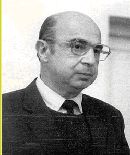|
Plenary
Lecture
On Mathematical
Models and Numerical Algorithms for Solution of Some Problems of Water Pollution

Professor David
Gordeziani
Dept. of
Mathematics
Iv. Javakhishvili Tbilisi State University
GEORGIA
E-mail:
dgord37@hotmail.com
Abstract:
The mankind, having improved in various fields of science and technology and
having liberalized, using environment resources and more deeply interfering in
the outer world, destroys the existing balance of the earth ecosystem. Research
of the ways of its prevention and rehabilitation is one of the most important
tasks of contemporary world. Via computer simulation mathematical modelling and
application of numerical analysis make possible to forecast these or those
parameters of water quality, to control and manage pollution processes. That
kind of observation and prediction are cost-effective and preserve expenses that
would be needed for arrangement and conduction of experiments; sometimes such
approach appears to be the only way of studying relevant phenomena. Thus,
mathematical modelling of diffusion processes in the environment and
investigation of pollution problems is one of the most actual and interesting
challenge of applied and computational mathematics. Therefore, mathematical
modelling and models themselves are being constantly improved, refined and in
some cases even simplified. Actually, a big variety of non-linear mathematical
models describing pollution processes exist, but in the current work we only
focus on linear mathematical models describing pollution transfer and diffusion
in water bodies. The literature concerning the research of problems and
mathematical modelling issues on the basis of classical equations of
mathematical physics with classical initial-boundary conditions is quite rich.
In some works concerning mathematical modelling of admixture diffusion processes
in various environments, the authors have encountered with the specific type of
equations that until recently were not used to describe the above mentioned
processes. Such equations are known under the name of “pluri-parabolic”
equations. Theoretical issues and algorithms of numerical solution of these
types of equations with classical initial-boundary conditions are poorly
studied, though investigation of the mentioned problems has substantial
theoretical and practical value. Here should be emphasized that in some cases
during the process of mathematical modelling of pollution problems we deal with
initial-boundary value problems with non-classical boundary conditions as well.
Quite often the questions of investigation of mathematical problems describing
pollution dissemination processes get down to classical equations of
mathematical physics with non-classical (e.g. non-local) initial-boundary
conditions. Finally, we would like to present mathematical models with
non-classical equations and non-classical boundary conditions (conditions of
Cannon, Bitsadze-Samarskii, their generalization and others). In the present
work some mathematical models of the mentioned type are considered, problems of
their numerical analysis and respective difference methods are developed and
studied.
Brief Biography of the Speaker:
David Gordeziani in 1961 graduated from Tbilisi State University,
Department of Mathematics and Mechanics. In 1961-1964
post-graduate studentship; then he was junior research worker of
A. Razmadze Institute of Mathematics, Georgian Academy of Sciences
(1964-1968); Senior scientific worker at I. Vekua Institute of
Applied Mathematics (1968-1969); Probationer of the Laboratory of
Numerical Analysis in the Paris University; head of the department
of Numerical Methods of I. Vekua Institute of Applied Mathematic;
Supervised the scientific work of the department in shell theory,
meteorology, ecology, magnetic hydro-dynamics, computation and
optimization of gas pipelines, took part in special scientific
works(1969-1979); Deputy Director of I. Vekua Institute of Applied
Mathematics (1979-1985) where he supervised the Institute
scientific-research works; in 1985-2006 director of I. Vekua
Institute of Applied Mathematics; head of Department of
Computational mathematics of Tbilisi State University; supervised
the Institute scientific-research works concerning investigation
and realization of different problems of mathematical physics and
mechanics of continuum media, problems of the theory of elastic
mixtures, nonlocal-in-time problems for some equations of
mathematical physics, mathematical models for computation of
thermo-elastic state of some energetic plants; full professor of
Tbilisi State University (2006-2009); from September 2009 Emeritus
at the Iv. Javakhishvili Tbilisi State University. Since 1963 till
now read the lectures in programming and computational
mathematics, mathematical modeling, functional analysis and
computational mathematics, numerical methods of partial
differential equations etc. at the Tbilisi State University. In
1966 defended Ph.D. thesis in specialty "Computational
mathematics". In 1981 defended a thesis for a Doctor of Science (habilitation)
degree in specialty "Computational mathematics" at the Moscow
State University. Supervised preparation and defenses of 17
Candidate thesis and 7 thesis for a Doctor of Science degree (habilitation).
He participated in organization and holding of many international,
republic congresses, symposiums, conferences, schools on
mathematics, computational mathematics, mechanics, theory of
shells, hydro-dynamics, magnetic hydrodynamics, informatics
(International Congresses of Mathematics, Athens Interdisciplinary
Olimpia, IUTAM Symposium, etc.). Was invited to carry lecture
courses and scientific researches, participation in congresses,
conferences and symposiums in scientific centers of many
countries. Hi is the author of more than 170 scientific
publications, 4 inventions (USSR), 2 patents (USA, Sweden) and 3
Monographs; the member of the Engineering Academy of Georgia; the
member of the International Academy of Computer Sciences and
Systems; the honorary president of Georgian Academy of Natural
Sciences, etc.; the member of editorial board of mathematical
journals, supervisor and team member in various international
grants and owner of different scientific and governmental awards,
prizes, medals and diplomas.
|